
- Undergraduate
- Research
- Off-Campus Study
- News & Events
- People
Back to Top Nav
Back to Top Nav
Original Article linked here.
High temperatures and humidity are enveloping the entire state, with areas of the Champlain Valley under an Extreme Heat Warning from 11 a.m. Monday until 8 p.m. on Tuesday.
"Heat indexes are going to be anywhere between, say, 95 and 105, with probably some locally higher amounts in some of the valleys," said Eric Myskowski, a meteorologist at the Burlington National Weather Service office. "So it's really going to be unpleasant."
The Champlain Valley is especially susceptible to hot weather because it's surrounded by mountains, meteorologists with the NWS say.
This heat wave is part of a longer-term trend in Vermont.
Vermont and the Northeast have always experienced heat waves — even during the ice ages. But human-caused climate change is making those heat waves hotter and happen more often.
Globally, climate change is making the hottest days hotter.
Monday night was the fourth-hottest on record in Burlington, according to state climatologist and University of Vermont professor Lesley-Ann Dupigny-Giroux.
"Extreme temperatures at night are a very clear signal of our changing climate," she said, but added that the greater variability in the weather Vermont now sees is also an indicator.
Dupigny-Giroux said hot nights stacked on hot days can be particularly dangerous for human health. She said the state — and communities — need to prepare for more heat and humidity in ways that reach everyone, regardless of what language they speak or where they live.
And while these very hot nights are impactful for human health, they're also bad for the economy, said Dartmouth climate scientist Justin Mankin.
"Our best estimate is that an extreme heat event generally lasts, in terms of its economic impacts, about three years," he said.
Mankin said heat waves can put farmers in debt, hurt public infrastructure and make workers less productive. That's especially so in places that are not prepared for them.
It's one of the many ways he said scientists — and society as a whole — have systematically underestimated the expense of climate change.
"This heat-humidity combination is something that the Northeast is just going to experience a lot more," he said.
Temperatures overall have risen by about 3 degrees Fahrenheit here since the beginning of the 20th century. And if the world continues emitting carbon from burning fossil fuels at its current pace, scientists say that the warming trend will continue through this century.
Burlington is one of the fastest warming cities in the United States, and a recent analysis of government climate data by the nonprofit Climate Central found that summer nights are strikingly warmer than they were even a few decades ago.
Burlington now sees about five times as many very hot nights as it did 25 years ago, the analysis found. And since 1970, the average minimum summer temperature — which generally happens at night — has risen by an average of 4.3 degrees.
Because it's the first extreme heat instance of the year, Myskowski said, people may not be as acclimated. It's important to take extra precautions to keep yourself hydrated and cool.
Extreme heat can increase the risk of headache, nausea, dehydration, and heat stroke, among other conditions, according to the Vermont Department of Health.
High humidity combined with extreme heat can be particularly dangerous because it prevents sweat from evaporating off your skin and providing a cooling effect.
More from NPR: 8 mistakes to avoid if you're going out in the heat
Older people, people with disabilities, people who are experiencing homelessness and people with chronic health conditions are most at risk for severe health effects due to the heat. If you're able, check in on your neighbors and the people who are most at risk in your community.
Here are a few ways to keep yourself cool in hot and humid conditions:
And don't forget about your furry friends! You'll want to limit their time outside, too, and make sure they're staying hydrated. Here are more tips from NPR for keeping your pets safe during extreme heat.
Whether your home is air conditioned or not, there are some things you can do to help keep your home in a comfortable temperature range.
Here are some quick tips for keeping your home cool:
Cooling shelters are available across the state for folks who need them.